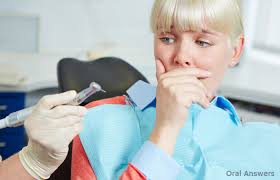
Dental Anxiety
Dental anxiety is more than just fear of the dentist, it also relates to anxiety or stress in any dental setting. Fear of visiting a dentist can result in people avoiding dental treatment for up to ten years, often when it is too late.
Triggers for dental anxiety include needles, drills or the dental setting in general.
When dental anxiety is severe and results in irrational fear and complete avoidance of going to the dentist, it can be classified as a dental phobia.
A history of mental health conditions including generalised anxiety disorder, depression, post-traumatic stress disorder, bipolar disorder or schizophrenia, or a previous history of head and neck trauma has been related to a person experiencing dental anxiety.
Symptoms of dental anxiety
People with dental anxiety may experience:
- sweating
- racing heartbeat (tachycardia) or palpitations
- low blood pressure and possible fainting (syncope)
- visible distress, crying or signs of panic
- withdrawal, or using humour or aggression to mask anxiety
These symptoms can be quite severe and people with dental anxiety would often not go to the dentist at all rather than suffer the symptoms
Dental anxiety can have a direct effect on your health
Avoiding the dentist means that early diagnosis of caries or gum disease, this can lead to more complex treatment that could have been avoided. Because dental anxiety is a learnt behaviour, every time the dental setting is avoided, this reinforces the dental anxiety even more.
Most dental disease is lifestyle-related and preventable. By avoiding going to the dentist, not only are you more likely to need more complex treatments when you do finally attend, but you are also missing out on learning how to better care for your oral health.
The lifestyle factors that lead to dental disease are very similar to those that lead to diabetes, obesity, heart disease, stroke and some cancers, so taking care of your oral and general health is very important.
How does dental anxiety start?
Dental anxiety usually starts with one of these events
- a traumatic dental experience or other healthcare experience(s)
- previous trauma to the head and neck
- other traumatic experiences, including abuse
- generalised anxiety, depression or post-traumatic stress disorder
- the view that the mouth is a personal area and accessing the mouth is an invasion of personal space
- fear of loss of control
- trust issues
- anxiety associated with other conditions such as agoraphobia (fear of being in situations where you feel you cannot escape), claustrophobia (fear of closed spaces) or obsessive-compulsive disorder where there is an obsession around cleanliness can make access to dental care more difficult.
Who is affected by dental anxiety?
Dental anxiety seems to affect people of any age. Although children are particularly vulnerable, in most cases can overcome their fear if the situation is managed well and they are well cared for and supported during further dental visits.
It seems that adults who are generally anxious tend to remain anxious about dental care throughout their life.
In Spain most Dentists are sympathetic towards anxious patients and can help them cope with the anxiety caused by going to the dentist.
Managing dental anxiety
It is important to let the Dentist know that you are prone to anxiety and they will be able to work with you designing a specific treatment plan to reduce the anxiety and make the experience less fearful.
Some coping techniques that can assist some individuals include:
- deep breathing
- meditation
- distraction (such as listening to music or the use of screens)
- guided imagery
- progressive muscle relaxation
Referral to a counsellor or therapist can be helpful too. Short targeted therapies including cognitive behavioural therapy can be very successful.
You can find a list of English-speaking counsellors and therapists here
Severe dental anxiety or phobia may require management with relative analgesia, anti-anxiety medication, or general anaesthesia.

Relative analgesia
Also known as laughing gas, nitrous oxide can help people relax during dental treatment. A mask is fitted to your face, and you breathe a mixture of oxygen and nitrous oxide. It takes effect within a few minutes and wears off quickly.
You will feel relaxed but will still be awake. You can talk to the dentist, and hear what they say to you, but you won’t necessarily remember everything once the visit is over.
Anti-Anxiety medication
Anti-anxiety (anxiolytic) medications (such as temazepam) are sometimes prescribed by dentists or doctors to help anxious patients relax. A short-acting, small, single dose is usually taken one hour before the dental appointment.
Remember that you should not drive a vehicle while under the influence of anxiolytic medication. It is better to have a friend or family member pick you up after the dental treatment.
General anaesthesia
Treatment under a general anaesthetic is carried out in a hospital setting by the dentist and anaesthetist. General anaesthesia involves patients being ‘fully asleep’. Some possible side effects include nausea and a longer recovery time than other forms of sedation.
A general anaesthetic can be a good option for some people but remember that it doesn’t help you learn coping strategies for anxiety or get used to going to see the dentist and may aggravate the symptoms of dental anxiety.
You will need both pre- and post-operative visits to the dentist. The anaesthetist will also need to assess you prior to the general anaesthetic. Patients cannot drive themselves home after a general anaesthetic.
Some dental treatments are better provided over several visits. This means that your treatment options may be more limited if you want all your dental treatment under general anaesthetic. Some people need a lot of treatment and it may not be possible to get enough anaesthetic time to finish all the treatment in one session.
In some instances, having some treatment done in the dental chair before the general anaesthetic will help prepare the mouth for the treatment that will be provided, to make best use of the general anaesthetic session.
General anaesthetic works best when used in conjunction with other strategies, so that some treatments can be done without general anaesthetic. This way, the general anaesthetic session time is kept for the treatments that are most difficult to cope with.
Find an English-speaking Dentist
If you do suffer from dental anxiety it is important that you are able to communicate with your dentist. The ESHA Spain business directory has a comprehensive list of English-Speaking Dentists in Spain.
https://eshaspain.org/directory/categories/english-speaking-dentists/
The NHS has an excellent website on Fear of Dentists
https://modalitypartnership.nhs.uk/self-help/livewell/topics/dentalhealth/fearofthedentist
Leave a reply





Leave a reply